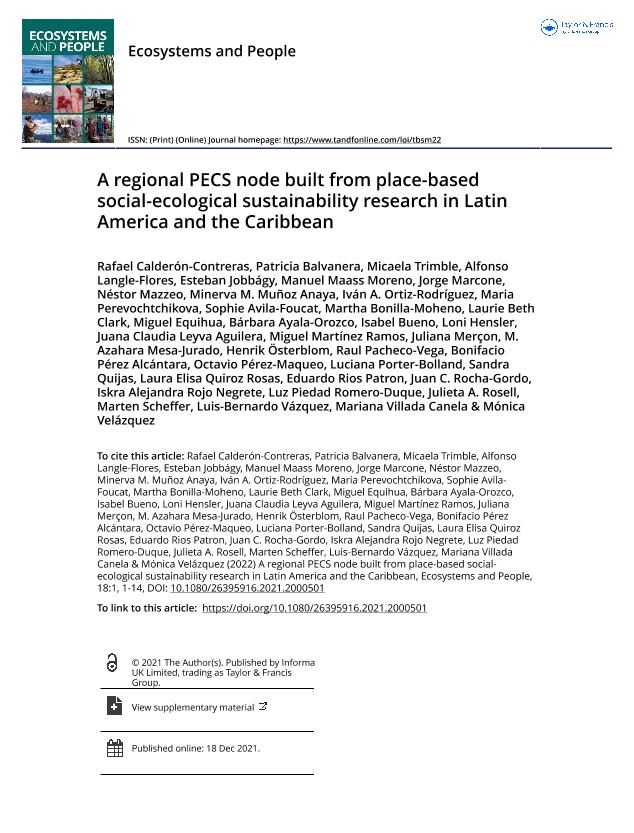Artículo
A regional PECS node built from place-based social-ecological sustainability research in Latin America and the Caribbean
Calderón Contreras, Rafael; Balvanera, Patricia; Trimble, Micaela; Langle Flores, Alfonso; Jobbagy Gampel, Esteban Gabriel ; Maass Moreno, Manuel; Marcone, Jorge; Mazzeo, Néstor; Muñoz Anaya, Minerva M.; Ortiz Rodríguez, Iván A.; Perevochtchikova, Maria; Avila Foucat, Sophie; Bonilla Moheno, Martha; Beth Clark, Laurie; Equihua, Miguel; Ayala Orozco, Bárbara; Bueno, Isabel; Hensler, Loni; Leyva Aguilera, Juana Claudia; Martínez Ramos, Miguel; Merçon, Juliana; Mesa Jurado, M. Azahara; Österblom, Henrik; Pacheco Vega, Raul; Pérez Alcántara, Bonifacio; Pérez Maqueo, Octavio; Porter Bolland, Luciana; Quijas, Sandra; Quiroz Rosas, Laura Elisa; Rios Patron, Eduardo; Rocha Gordo, Juan C.; Rojo Negrete, Iskra Alejandra; Romero Duque, Luz Piedad; Rosello, Julieta; Scheffer, Marten; Vázquez, Luis Bernardo; Villada Canela, Mariana; Velázquez, Mónica
; Maass Moreno, Manuel; Marcone, Jorge; Mazzeo, Néstor; Muñoz Anaya, Minerva M.; Ortiz Rodríguez, Iván A.; Perevochtchikova, Maria; Avila Foucat, Sophie; Bonilla Moheno, Martha; Beth Clark, Laurie; Equihua, Miguel; Ayala Orozco, Bárbara; Bueno, Isabel; Hensler, Loni; Leyva Aguilera, Juana Claudia; Martínez Ramos, Miguel; Merçon, Juliana; Mesa Jurado, M. Azahara; Österblom, Henrik; Pacheco Vega, Raul; Pérez Alcántara, Bonifacio; Pérez Maqueo, Octavio; Porter Bolland, Luciana; Quijas, Sandra; Quiroz Rosas, Laura Elisa; Rios Patron, Eduardo; Rocha Gordo, Juan C.; Rojo Negrete, Iskra Alejandra; Romero Duque, Luz Piedad; Rosello, Julieta; Scheffer, Marten; Vázquez, Luis Bernardo; Villada Canela, Mariana; Velázquez, Mónica
 ; Maass Moreno, Manuel; Marcone, Jorge; Mazzeo, Néstor; Muñoz Anaya, Minerva M.; Ortiz Rodríguez, Iván A.; Perevochtchikova, Maria; Avila Foucat, Sophie; Bonilla Moheno, Martha; Beth Clark, Laurie; Equihua, Miguel; Ayala Orozco, Bárbara; Bueno, Isabel; Hensler, Loni; Leyva Aguilera, Juana Claudia; Martínez Ramos, Miguel; Merçon, Juliana; Mesa Jurado, M. Azahara; Österblom, Henrik; Pacheco Vega, Raul; Pérez Alcántara, Bonifacio; Pérez Maqueo, Octavio; Porter Bolland, Luciana; Quijas, Sandra; Quiroz Rosas, Laura Elisa; Rios Patron, Eduardo; Rocha Gordo, Juan C.; Rojo Negrete, Iskra Alejandra; Romero Duque, Luz Piedad; Rosello, Julieta; Scheffer, Marten; Vázquez, Luis Bernardo; Villada Canela, Mariana; Velázquez, Mónica
; Maass Moreno, Manuel; Marcone, Jorge; Mazzeo, Néstor; Muñoz Anaya, Minerva M.; Ortiz Rodríguez, Iván A.; Perevochtchikova, Maria; Avila Foucat, Sophie; Bonilla Moheno, Martha; Beth Clark, Laurie; Equihua, Miguel; Ayala Orozco, Bárbara; Bueno, Isabel; Hensler, Loni; Leyva Aguilera, Juana Claudia; Martínez Ramos, Miguel; Merçon, Juliana; Mesa Jurado, M. Azahara; Österblom, Henrik; Pacheco Vega, Raul; Pérez Alcántara, Bonifacio; Pérez Maqueo, Octavio; Porter Bolland, Luciana; Quijas, Sandra; Quiroz Rosas, Laura Elisa; Rios Patron, Eduardo; Rocha Gordo, Juan C.; Rojo Negrete, Iskra Alejandra; Romero Duque, Luz Piedad; Rosello, Julieta; Scheffer, Marten; Vázquez, Luis Bernardo; Villada Canela, Mariana; Velázquez, Mónica
Fecha de publicación:
11/2022
Editorial:
Taylor & Francis Ltd
Revista:
Ecosystems and People
ISSN:
2639-5908
e-ISSN:
2639-5916
Idioma:
Inglés
Tipo de recurso:
Artículo publicado
Clasificación temática:
Resumen
Sustainability requires a combination of meaningful co-production of locally relevant solutions, synthesis of insights gained across regions, and increased cooperation between science, policy and practice. The Programme for Ecosystem Change and Society (PECS) has been coordinating Place-Based Social-Ecological Sustainability Research (PBSESR) across the globe and emphasizes the need for regional scientific nodes from diverse biocultural regions to inform sustainability science and action. In this paper, we assess the strengths of the PBSESR communities in Latin America and the Caribbean (LAC). We provide an overview of PBSESR literature associated with this region and highlight the achievements of two prominent regional networks: The Social-Ecological Systems and Sustainability Research Network from Mexico (SocioEcoS) and the South American Institute for Resilience and Sustainability Studies from Uruguay (SARAS Institute). Finally, we identify the potential in these nodes to constitute a regional PECS node in Latin America and discuss the capacity needed to ensure such function. The results of the literature review show that while still loosely interconnected across the region, networks play key roles in connecting otherwise cloistered teams and we illustrate how the SocioEcoS network (focusing on transdisciplinary co-production of knowledge towards sustainability) and the SARAS Institute (focusing on innovative approaches for looking at complex social-ecological problems, rooted in slow science and arts) operate as key connectors in the region. We conclude that these organizations combined can embody a Latin American node for PECS, and would thereby not only contribute to regional but also global capacities to advance the sustainability agenda.
Archivos asociados
Licencia
Identificadores
Colecciones
Articulos(IMASL)
Articulos de INST. DE MATEMATICA APLICADA DE SAN LUIS
Articulos de INST. DE MATEMATICA APLICADA DE SAN LUIS
Citación
Calderón Contreras, Rafael; Balvanera, Patricia; Trimble, Micaela; Langle Flores, Alfonso; Jobbagy Gampel, Esteban Gabriel; et al.; A regional PECS node built from place-based social-ecological sustainability research in Latin America and the Caribbean; Taylor & Francis Ltd; Ecosystems and People; 18; 1; 11-2022; 1-14
Compartir
Altmétricas



